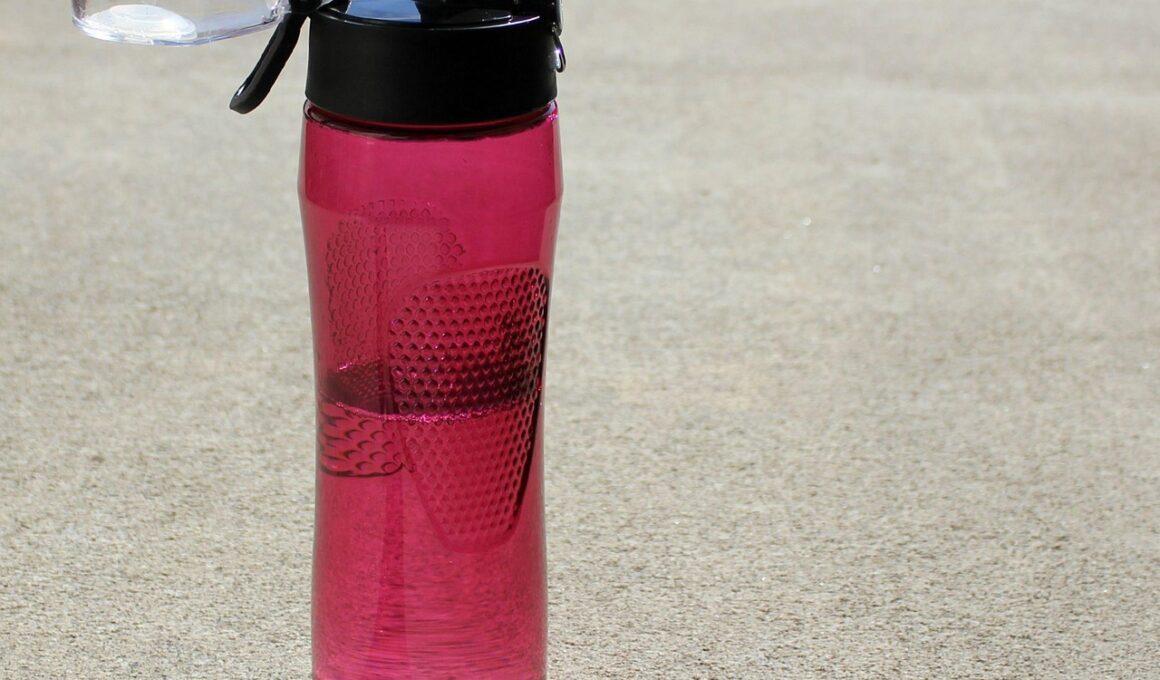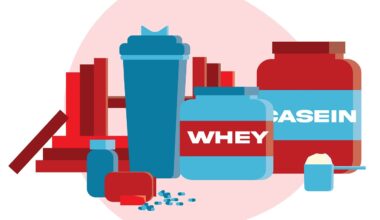Tracking Your Hydration: Tools and Techniques Post-Workout
Maintaining proper hydration after workouts is crucial to recovery and overall well-being. Your body loses fluids through sweat and respiration during physical activity, making it essential to replace them promptly. Drinking water or electrolyte beverages is important, but tracking your intake through various methods can enhance your hydration strategy. Setting hydration goals based on body weight, climate, and workout intensity can help establish a routine. Prioritize measuring your weight pre- and post-workout to understand fluid loss. This crucial measurement will inform how much to drink after exercising. Use tools like apps or smart water bottles that track your intake throughout the day. Entry of your fluid consumption can help develop good habits and recognize patterns in hydration. Visual reminders such as sticky notes on your water bottle or phone alerts can help you stay accountable. When deciding on beverages for hydration, consider not only water but sports drinks with electrolytes to replenish lost minerals. Prioritizing awareness and strategies around hydration can lead to improved workout recovery, better performance, and enhanced overall health.
There are several factors to consider when determining your hydration needs after exercise. Factors such as body weight, intensity of the workout, and environmental conditions all play a role in how much fluid you should consume. A reliable approach is to develop a personalized hydration plan based on these individual factors. For instance, heavier individuals or those experiencing higher sweat rates due to heat or humidity should consider increasing their post-workout fluid intake accordingly. Also, tailor your choices of hydration options based on the duration of your sessions. If you engage in low-intensity activities, plain water might suffice. However, prolonged and intense events can deplete electrolyte levels, thus requiring electrolyte-rich drinks for replenishment. Also, keep an eye on the color of your urine, which can serve as a quick hydration test — pale yellow indicates proper hydration while darker shades suggest the need for increased fluid intake. In addition to helping with physical recovery, hydration has a direct impact on cognitive function and mood. Remember that both your performance and mental sharpness hinge on your hydration habits after each workout.
Effective Hydration Tools and Techniques
Utilizing technology can significantly enhance your post-workout hydration strategy. Many smartphone applications are available to assist you in tracking your daily fluid intake. These applications often include customizable settings, allowing for individual adjustments based on various activities and weather conditions. Regularly updating your hydration goals in these applications can foster accountability, making you more likely to meet your recommended intake. Additionally, consider investing in a smart water bottle that logs your intake, providing insights into your hydration habits effortlessly. Some smart bottles even send notifications to remind users when it’s time to drink. These reminders can be especially helpful when daily schedules become hectic. Other innovative tools include hydration tracking wristbands that monitor sweat loss during physical activity, offering real-time data to better inform your hydration needs. If using manual methods, you can create a simple log or chart to help visualize your fluid consumption throughout the day. Keeping track can make all the difference in motivating you to stay consistent with hydration, ultimately leading to improved physical results and overall wellness.
A key component to successful hydration is timing. Knowing when to hydrate is just as important as knowing how much. It’s generally recommended to start rehydrating immediately after your workout to begin the recovery process. The longer you wait, the more dehydration may affect your body. Breaking up your post-workout hydration into smaller amounts consumed throughout the day helps to maintain optimal hydration levels. Rather than downing a large volume at once, focus on sipping fluids gradually. This method allows your body to absorb and utilize the water more effectively. If you exercised in the heat, incorporating electrolyte-rich drinks can aid in replenishing lost minerals. Flavoring your water can make drinking more enjoyable, encouraging more frequent intake. Herbal teas, infused fruits, or even electrolyte tablets can be excellent options for invigorating your drinks. It’s important to remain aware of your individual preferences and to adjust according to personal taste and nutritional requirements. Aim to prioritize hydration, making it a crucial component of your post-workout routine. The benefits of proper rehydration cannot be overstated and contribute directly to improved performance.
Signs of Dehydration to Watch For
Recognizing the signs of dehydration is crucial for ensuring that your post-workout hydration strategies are effective. Common symptoms can include dry mouth, fatigue, dizziness, and reduced urine output. Paying attention to your body’s signals and being proactive about hydration can help prevent these issues. It’s important to differentiate between mild dehydration and severe dehydration, as the latter can lead to serious complications. Consider tracking your daily water consumption in correlation to your exercise levels; this will help identify patterns in your hydration habits. Often, you may not feel thirsty until you are already mildly dehydrated, which demonstrates the need for a proactive approach in drinking fluids. Mood changes such as increased irritability or trouble focusing can also indicate a lack of hydration. Keep an eye on your endurance during workouts as well; reduced performance can signal insufficient hydration levels. Maintaining adequate hydration supports not only physical performance but also cognitive functions. Aim to maintain a consistent fluid intake before, during, and after exercises to minimize the risk of dehydration and its associated drawbacks.
Educating yourself about nutrition can complement your hydration strategies post-workout. Proper nutrition not only supports hydration but also aids in recovery and performance. Foods with high water content, such as fruits and vegetables, can be beneficial additions to your diet. Incorporate items like watermelon, oranges, and cucumbers that provide both hydration and essential nutrients to optimize your recovery. Electrolyte-rich foods such as bananas, spinach, or yogurt can also help balance fluid in your body effectively. Aim to create balanced meals that include both carbohydrates and proteins, which are crucial after workouts. Carbohydrates help replenish energy stores, while proteins contribute to muscle repair. Combining fluids with these nutrient-dense foods ensures that you are rehydrating effectively while also nourishing your body. Meal timing is also important; eating a balanced meal within 30 to 60 minutes post-exercise can greatly improve recovery. Consider prep work in advance, such as having snacks readily available after workouts, to enhance your nutritional intake. The relationship between proper nutrition and hydration cannot be overstated when aiming for improved performance in future workouts.
Hydration and Mental Performance
Staying hydrated does not just benefit your physical performance during workouts but also plays a significant role in enhancing mental performance. Hydration levels directly impact brain function, affecting concentration, decision-making, and overall cognitive abilities. It is well-documented that dehydration can lead to decreased focus, increased feelings of fatigue, and mood changes. This suggests that a well-rounded hydration strategy can have lasting effects beyond physical activity. By embracing good hydration practices, individuals can improve their mental sharpness and stamina, leading to better work performance, enhanced creativity, and improved problem-solving skills. Hydration strategies should not be thought of solely in the context of physical workouts; rather, they should be integrated into daily routines. Consistent, adequate fluid intake throughout the day fosters both physical and mental clarity, ensuring that optimal performance is maintained in all aspects of life. Simple strategies like keeping a water bottle at your desk or setting reminders on your phone can greatly assist in promoting hydration. Ultimately, understanding the broad benefits of hydration enables individuals to maintain high levels of performance in various spheres of their lives.
In conclusion, tracking your hydration post-workout is vital to enhance recovery, performance, and overall health. By employing various tools and techniques, individuals can create customized hydration strategies that cater to their specific needs. Intention behind hydration should include the balanced intake of electrolytes and awareness of personal body signals. Whether employing technology or focusing on nutrition, the key is to foster consistent hydration habits. By prioritizing hydration as part of your wellness journey, not only do you enhance recovery after workouts, but you also support your overall performance in daily activities. Remember to monitor your hydration levels, educate yourself on signs of dehydration, and incorporate hydration-friendly foods into your diet. Staying proactive about hydration brings long-term benefits for both your body and mind. As you embark on your fitness journey, plan ahead to develop sustainable hydration practices. The methods discussed herein can serve as valuable assets in our quest for improved performance. Share your experiences and hydration practices with peers, as this positive behavior can inspire collective better hydration habits. Embrace effective hydration tools, listen to your body, and enjoy the journey towards optimal health.


